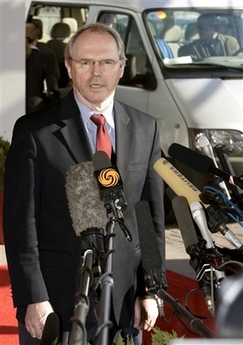US envoy sees potential in N.Korea talks
(AP)Updated: 2007-01-22 10:33
EIJING - The US envoy to talks on North Korea's nuclear disarmament said Monday he believed there was potential for progress in the next round of negotiations and China would soon announce a start date.
The comments follow pledges by the key players, Washington and Pyongyang, to strive for progress in the slow-moving negotiations.
The Chinese-organized international talks took on added urgency after North Korea alarmed the world in October by testing a nuclear bomb. But the latest round ended in December in Beijing with no breakthroughs.
US Assistant Secretary of State Christopher Hill told reporters that Washington was disappointed with the lack of progress in the last round but that he believed there was "a basis for making progress" when negotiators meet again. He did not elaborate.
Hill said that in talks Sunday with his Chinese counterpart, Wu Dawei, the two sides agreed the high-level negotiations should start again "as soon as possible."
"We hope that the Chinese government will be able to announce soon the start up of the talks," he said.
Meanwhile, South Korean media reported that North Korea has agreed to discuss the disarmament of its nuclear weapons when talks resume, which would mark a shift in the North's stance.
North Korea agreed to directly address moves to disarm when Hill and the North's chief nuclear envoy, Kim Kye Gwan, met in Berlin last week, the Yonhap news agency reported, citing unidentified diplomatic sources.
Previously, Pyongyang said it would not discuss nuclear disarmament unless the United States first lifted financial restrictions imposed for the North's alleged counterfeiting and money laundering.
Separate talks between the US and North Korea on the financial sanctions issue were also expected to resume soon, but no date or location had been fixed yet, Hill said.
"I think they will be very soon, probably the same time or before the six party talks," he said.
The participants in the six-party talks are North Korea, the United States, Japan, South Korea, China and Russia.
|
||
|
||
|
|


